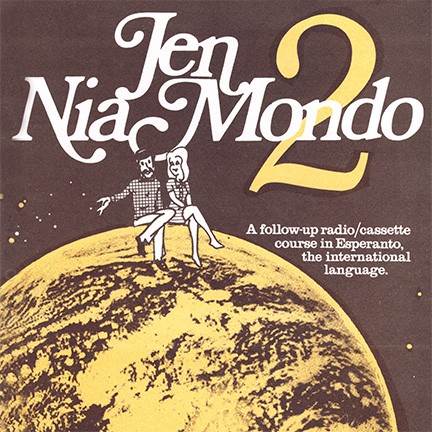
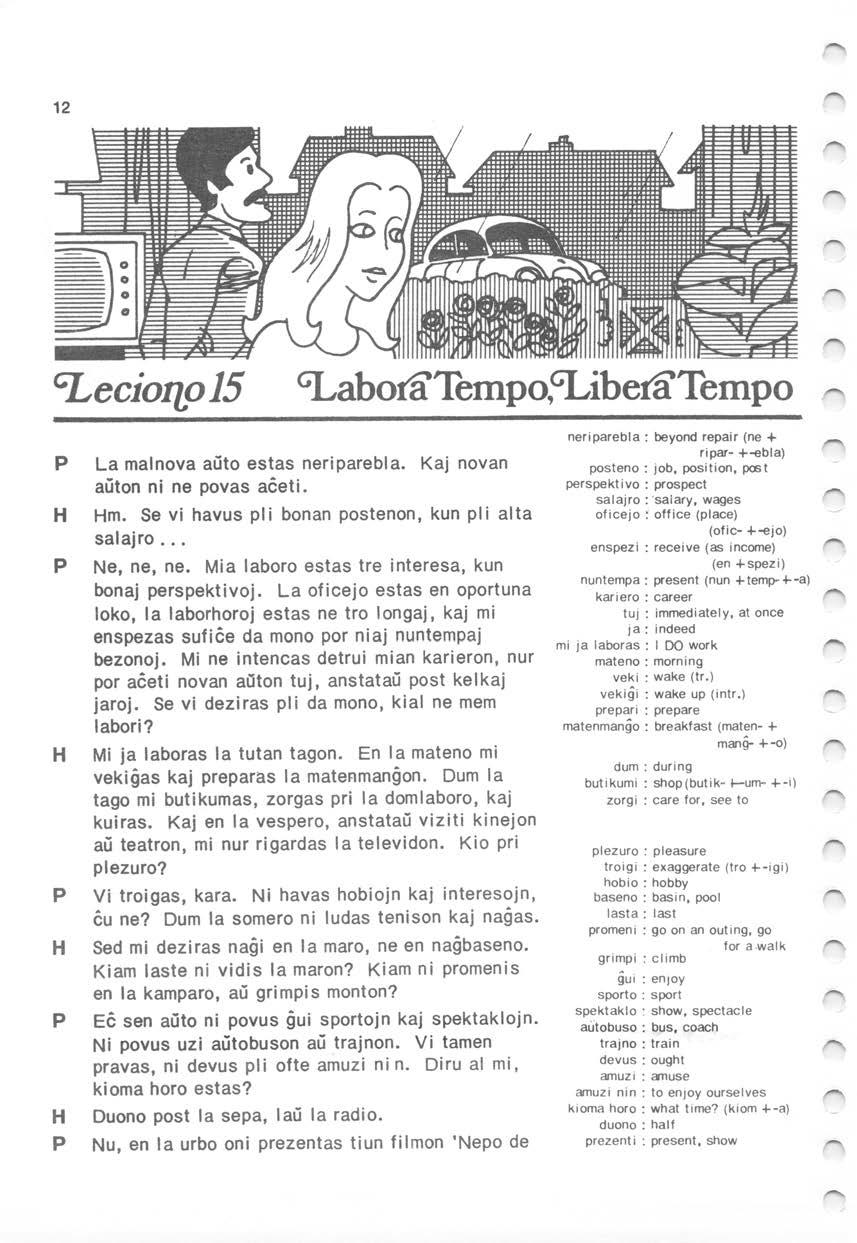
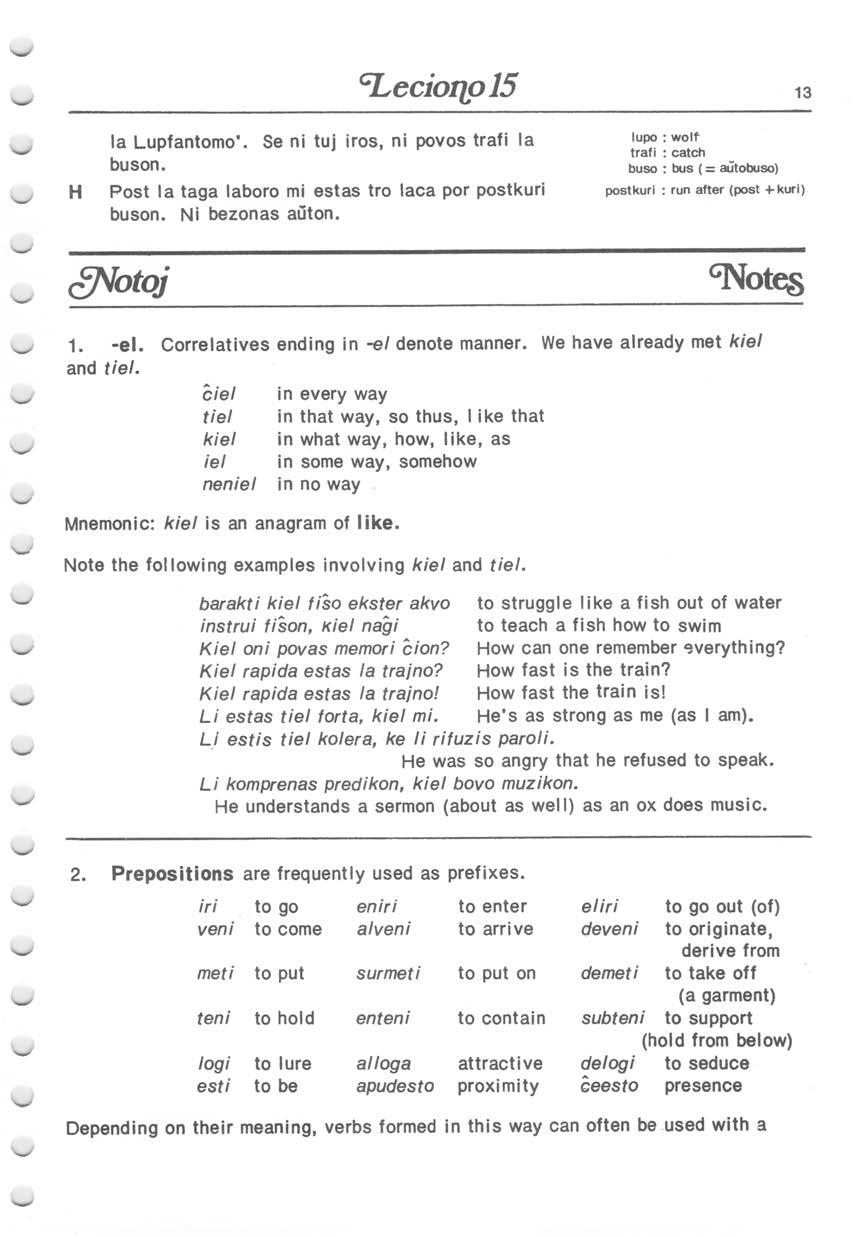
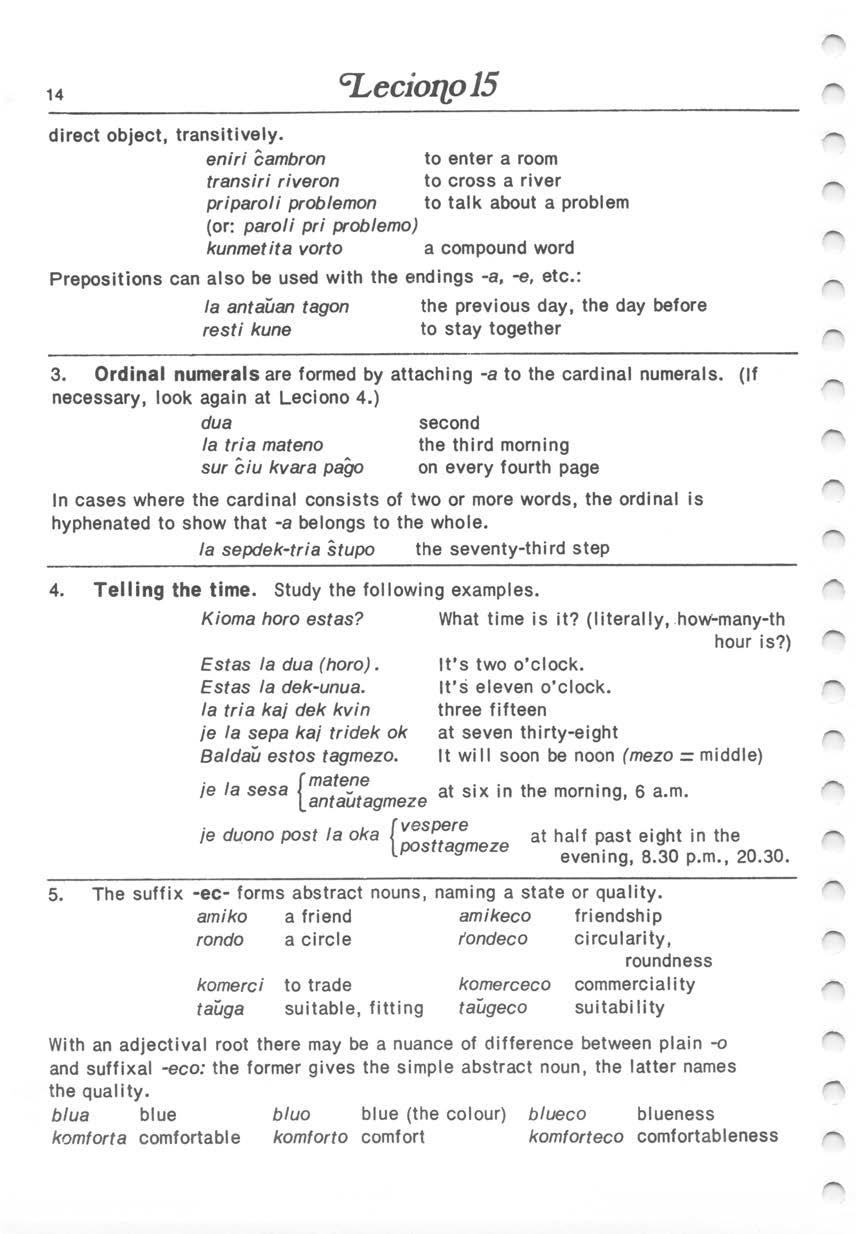
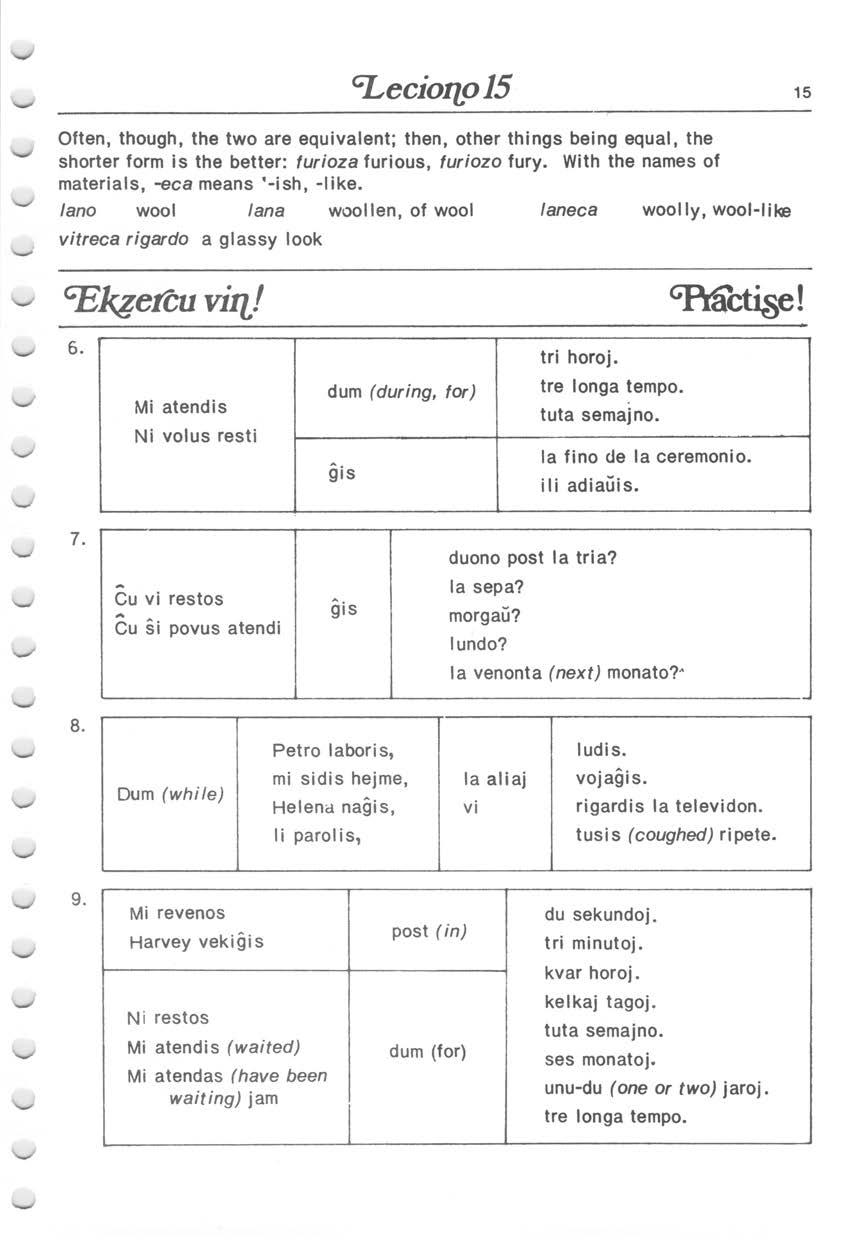
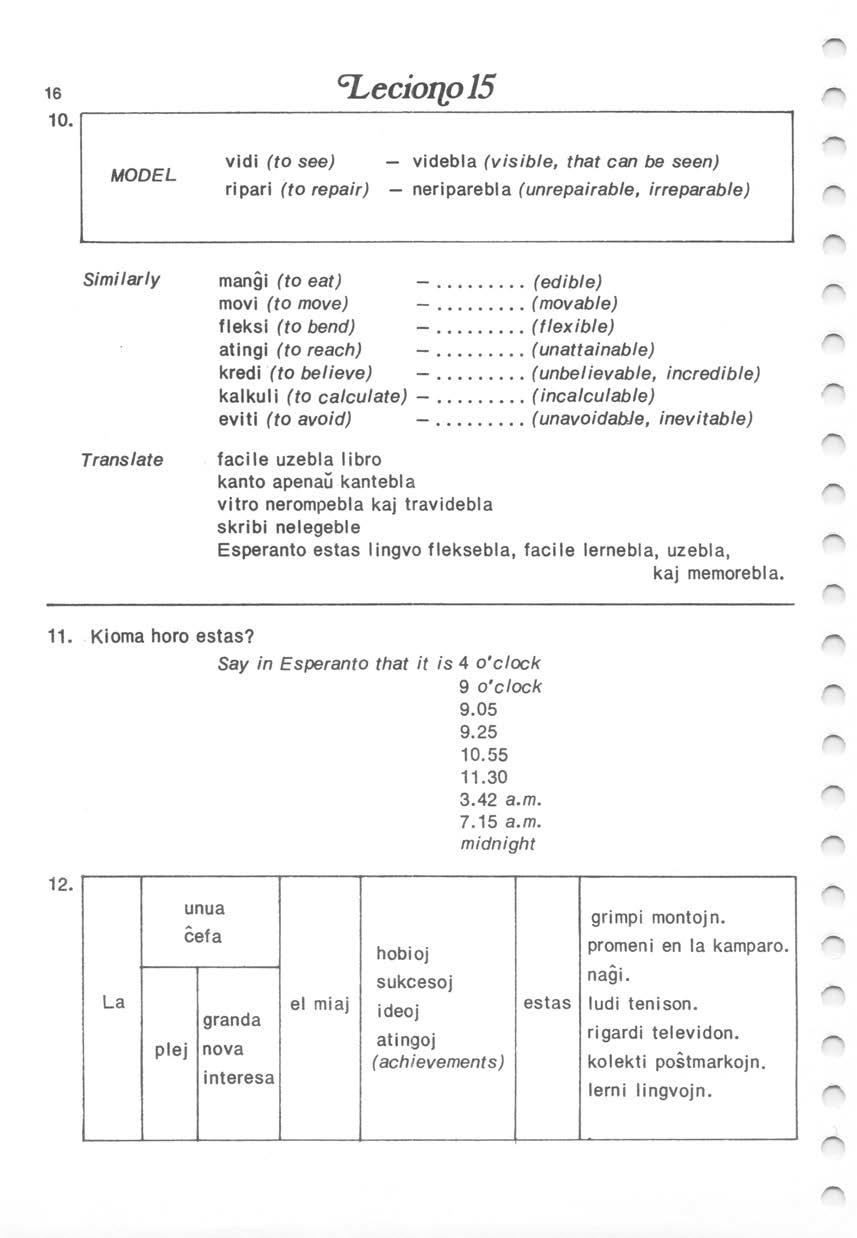
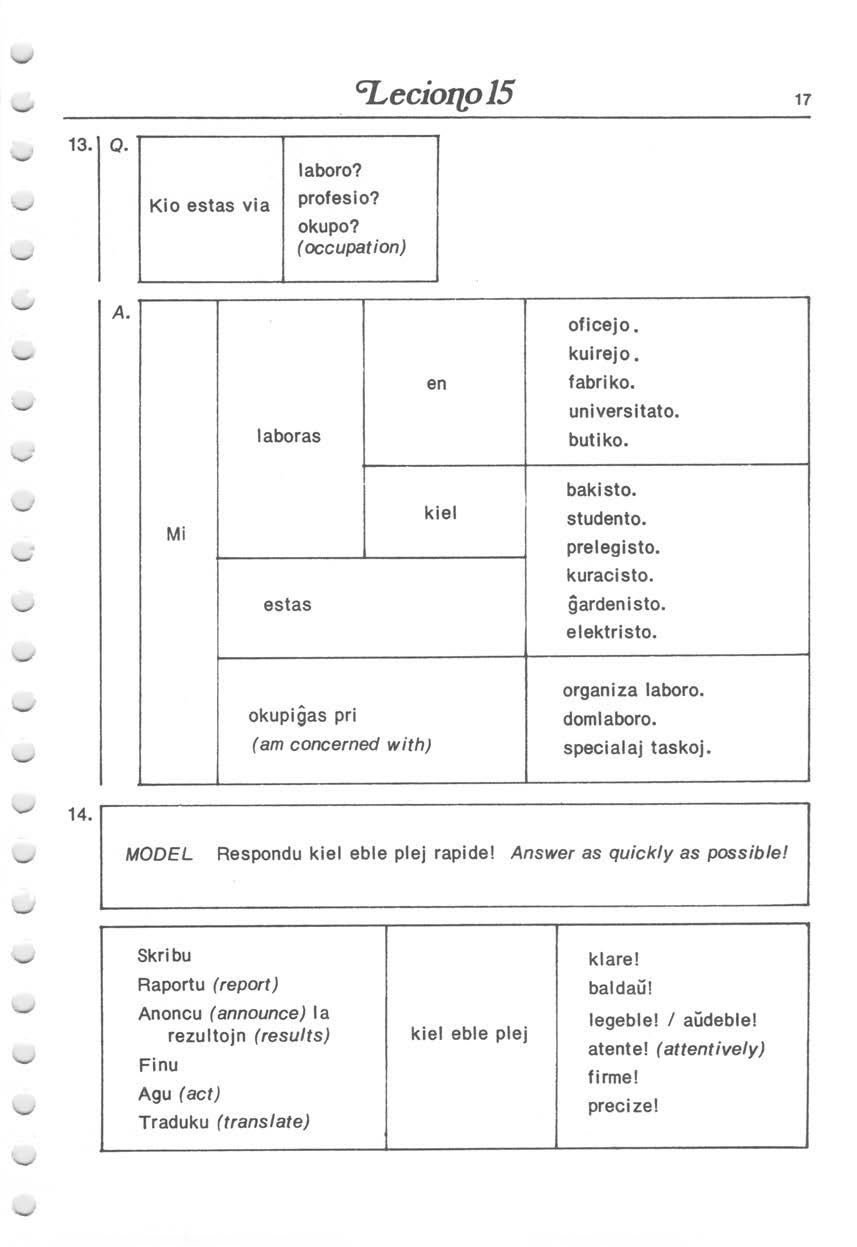
Section 15 Traduku
Paul (Paŭlo): Hi, Mary. Come and sit with us. We are talking about hobbies. What hobbies do you have, Mary?
Mary (Maria): Not as many as you three have. I don’t like swimming, especially in the sea. It is usually too cold. I don’t travel, because I do not have a car. I certainly do not wish to climb mountains. I do not earn sufficient money to travel by bus or train.
Peter (Petro): But you watch films in the cinema. You often tell us about films you have seen. You also watch films on the television. You inform us which are suitable for children.
Helen (Helena): In the summer you and I Mary often play tennis.
Paul: You two play the game as slowly as possible. I have watched for two hours and someone has had to wake me up.
Peter: Had you nothing better to do?
Mary: Are you asking him or Helena and me?
Paul: I think he is asking me. I was just reporting on the tennis. As you know, I do not like the game, even if they played it as fast as possible.

Answers are offered below
As previously you are recommended to commit as much to writing as possible.
Please attempt the exercises before consulting the material below.
Lesson 15 Answers
Section 6
Mi atendis dum tri horoj – I waited (for) three hours
Mi atendis dum tre longa tempo – I waited (for) a very long time
Ni volus resti ĝis la fino de la ceremonio – We would wish to stay till the end of the ceremony [if possible]
Ni volus resti dum tuta semajno – We would want to stay (for) a whole week [if possible]
Mi atendis ĝis ili adiaŭis – We waited till they said goodbye
Note 1: ‘us’ indicates conditions are attached so it is called the conditional ending. It does not express time so sometimes an adverb like ‘jam’ or ‘baldaŭ’ may be included.
Note 2: Esperanto requires the use of the preposition most logical in the situation. This is usually though not always determinable.
Section 7
Ĉu vi restos ĝis duono post la tria? – Will you stay (on) till half three?
Ĉu ŝi povus atendi ĝis la sepa? – Would she be able to wait till seven (o’clock) [if possible]?
Ĉu vi restos ĝis morgaŭ – Will you stay (over) till tomorrow?
Ĉu ŝi povus atendi ĝi lundo? – Would you be able to wait till Monday [if conditions OK]?
Ĉu vi restos ĝis la venonta monato? – Will you be staying till the next month?
Note: the ‘us‘ endings draw attention to possible conditions / circumstances ‘interferring’
Section 8
Dum Petro laboris, la aliaj ludis – While Peter was working, the others were playing.
Dum mi sidis hejme, vi vojaĝis. – While I sat at home, you were travelling
Dum Helena naĝis, la aliaj rigardis (spektis) la televidon – While Helena swam, the others watched TV
Dum li parolis, vi tusis ripete – While he talked, you coughed repeatedly / again and again
Note: Esperanto prefers to keep commas.
Section 9
Mi revenos post du sekundoj – I’ll come back in two seconds
Mi revenos post tri minutoj – I’ll return in three minutes
Helena vekiĝis post kvat horoj – Helena work up three hours later
Ni restos dum kelkaj tagoj – We’ll stay (for) several days
Mi atendis dum tuta semajno – I waited (for) a whole week
Mi atendas jam dum ses monatoj – I have been waiting now (for) six months
Mi atendas jam dum unu-du jaroj – I am waiting now (for) a year or two
Mi atendas jam tre longa tempo – I have been waiting (for) a very long time already
Section 10
manĝi – manĝebla (eatable, worth eating)
movi – movebla (movable, mobile)
fleksi – fleksebla (flexible, bendable)
atingi – neatingebla (unreachable)
kredi – nekredebla (unbelievable, incredible)
kalkuli – nekalkulebla (incalculable)
eviti – neevitebla (unavoidable, inevitable)
Note: no need to worry if it ‘s spelt –abl or –ibl! It’s always the inbetween ‘ebl‘
Facile uzebla libro – an easy to use book
Kanto apenaŭ kantebla – a scacely singable song
vitro nerompebla kaj travidebla – glass that’s unbreakable and see-through
skribi nelegeble – to write illegibly
Esperanto estas lingvo fleksebla, facile lernebla, uzebla, kaj memorebla – Esperanto is a language that’s flexible, easy to learn, use and remember.
Section 11
Estas la kvara (horo) – It’s 4 o’clock
Estas la naŭa (horo) – It’s 9 o’clock
Estas la naŭa (horo) kaj kvin (minutoj) – It’s 9.05 (read – it’s nine oh five)
Estas la naŭa (horo) (kaj) dudek kvin – It’s 9.25 (read – it’s nine twenty-five or twenty-five past nine)
Estas la deka (horo) (kaj) kvindek kvin – It’s 10.55 (read – it’s ten fifty-five or five to eleven)
Estas la dekunua (horo kaj) tridek – it’s eleven thirty or half eleven
Estas la tria (horo kaj) kvardek du frumatene – It’s three forty-two in the early morning /in the night.
Estas la sep dekkvin / kaj kvarono matene – It’s seven fifteen / a quarter past seven in the morning
Estas noktomezo – It’s midnight
Section 12
La unua el miaj hobioj estas grimpi montojn – the first of my hobbies is climbing mountains / Climbing mountains is the first (leading) of my hobbies
La ĉefa el miaj sukcesoj estas naĝi – My chief /main success is (in) swimming
La plej granda el miaj ideoj estyas lerni lingvojn – The biggest of my ideas / My biggest ideas is to learn a language
La plej nova el miaj hobioj estas ludi tenison – My newest hobby is playing tennis
La plej interesa el miaj atingoj estas kolekti poŝtmarkojn – My most interesting achievement is collecting (postal) stamps
La ĉefa el miaj hobioj etsas promeni en la kamparo – My main hobby is walking in the countryside
La ĉefa el miaj atingoj estas rigardi televidon – The main
Note: Using ‘la grimpado de montoj’ etc is perfectly acceptable but not as compact as the infinitive.
Section 13
Kio estas via laboro? Mi laboras en oficejo – What’s your job? I work in an office.
Kio estas via profesio? Mi laboras en universitato – What is your profession? I work in a university
Kio estas via okupo? Mi estas ĝardenisto – What’s your occupation? I am a gardener
Kio estas via laboro? Mi laboras en fabriko. – What is your work? I work in a factory.
Kio estas via profesio? Mi laboras kiel bakisto. – What is your profession? I work as a baker
Kio estas via okupo? Mi estas studento – What’s your occupation? I am a student
Kio estas via okupo? Mi okupiĝas pri specialaj taskoj. What is your occupation? I am involved with special tasks
Section 14
Skribu kiel eble plej klare – Write as clearly as possible
Raportu kiel eble plej baldaŭ – Report as soon as possible
Anouncu la rezultojn kiel eble plej precize – Announce the results as precisely as possible
Finu kiel eble plej baldaŭ – Finiŝ as soon as possible
Agu kiel eble plej firme – Act as firmly as possible
Traduku kiel eble plej atente – Translate as attentively as possible
Skribu kiel eble plej legeble – Write as legibly as possible
Section 15
Paŭlo: Saluton, Maria. Venu kaj sidiĝu kun ni. Ni parolas pri hobioj. Kiujn hobiojn vi havas, Maria?
Maria: Ne tiel multe kiel vi tri. I don’t like swimming, especially in the sea. It is usually too cold. I don’t travel, because I do not have a car. I certainly do not wish to climb mountains. I do not earn sufficient money to travel by bus or train.
Peter (Petro): But you watch films in the cinema. You often tell us about films you have seen. You also watch films on the television. You inform us which are suitable for children.
Helen (Helena): In the summer you and I Mary often play tennis.
Paul: You two play the game as slowly as possible. I have watched for two hours and someone has had to wake me up.
Peter: Had you nothing better to do?
Mary: Are you asking him or Helena and me?
Paul: I think he is asking me. I was just reporting on the tennis. As you know, I do not like the game, even if they played it as fast as possible.
Lesson 15 : Experts say knowing words is more important than mastering grammar
Ag/i
Amuz/i
Amuz/i ni/n
Atent/a
Anonc/i
Aŭto/bus/o
Basen/o
Bus/o
Butik/um/i
Ĉiel
Dev/us
Dum
Du/on/o
En/spez/i
Grimp/i
Ĝu/i
Hobi/o
Iel
Ja
Karier/o
Kiel
Kiom/a hor/o
Last/a
Lup/o
Manĝi
Manĝo
Maten/o
Maten/manĝ/o
Mi ja labor/as
Neniel
Ne/ripar/ebl/a
Nun/temp/a
Ofic/o
Ofic/ej/o
Okup/i
Okup/iĝ/i pri
Okup/o
Perspektiv/o
Plezur/o
Posten/o
Post/kur/i
Prepar/I
Prezent/i
Promen/i
Raport/i
Salajr/o
Spektakl/o
Sport/o
Tiel
Traduk/i
Traf/i
Trajn/o
Tro/ig/i
Tuj
Vek/i
Vekiĝ/i
Zorg/i
Act
Amuse
Enjoy ourselves
Attentive
Announce
Bus, coach
Basin, pool
Bus
Shop cf boutique
In every way
Ought (on condition)
During
Half
Receive (as income)
Climb
Enjoy
Hobby
In some way, somehow
Indeed
Career
In what way, how, like,
What hour / time
Last, ultimate
Wolf
Eat cf mangy
Meal
Morning cf mattens
Breakfast
I do work
In no way
Beyond repair
Present
Office, function, duty
Office (place )
Occupy, engage
Be occupied with
Occupation
Prospect
Pleasure
Job, position, post
Run after, chase
Prepare
Present, show
Go on an outing, walk
Report
Salary, wages
Spectacle
Sport
In that way, so, thus
Translate
Catch
Train
Exaggerate
Immediately, at once
Wake tr, awaken tr
Become awake ntr
Care for, look after